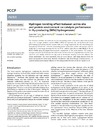Identificador persistente para citar o vincular este elemento:
https://accedacris.ulpgc.es/jspui/handle/10553/74772
| Título: | Hydrogen bonding effect between active site and protein environment on catalysis performance in H2-producing [NiFe] hydrogenases | Autores/as: | Qiu, Siyao Azofra Mesa, Luis Miguel MacFarlane, Douglas R. Sun, Chenghua |
Clasificación UNESCO: | 221001 Catálisis | Fecha de publicación: | 2018 | Publicación seriada: | Physical Chemistry Chemical Physics | Resumen: | The interaction between the active site and the surrounding protein environment plays a fundamental role in the hydrogen evolution reaction (HER) in [NiFe] hydrogenases. Our density functional theory (DFT) findings demonstrate that the reaction Gibbs free energy required for the rate determining step decreases by 7.1 kcal mol1 when the surrounding protein environment is taken into account, which is chiefly due to free energy decreases for the two H+/e addition steps (the so-called Ni-SIa to I1, and Ni-C to Ni-R), being the largest thermodynamic impediments of the whole reaction. The variety of hydrogen bonds (H-bonds) between the amino acids and the active site is hypothesised to be the main reason for such stability: H-bonds not only work as electrostatic attractive forces that influence the charge redistribution, but more importantly, they act as an electron ‘pull’ taking electrons from the active site towards the amino acids. Moreover, the electron ‘pull’ effect through H-bonds via the S in cysteine residues shows a larger influence on the energy profile than that via the CN ligands on Fe. | URI: | https://accedacris.ulpgc.es/handle/10553/74772 | ISSN: | 1463-9076 | DOI: | 10.1039/C7CP07685A | Fuente: | Physical chemistry chemical physics [ISSN 1463-9076], v. 20, p. 6735-6743 |
| Colección: | Artículos |
Citas de WEB OF SCIENCETM
Citations
15
actualizado el 01-feb-2026
Visitas
67
actualizado el 10-ene-2026
Descargas
111
actualizado el 10-ene-2026
Google ScholarTM
Verifica
Altmetric
Comparte
Exporta metadatos
Los elementos en ULPGC accedaCRIS están protegidos por derechos de autor con todos los derechos reservados, a menos que se indique lo contrario.
